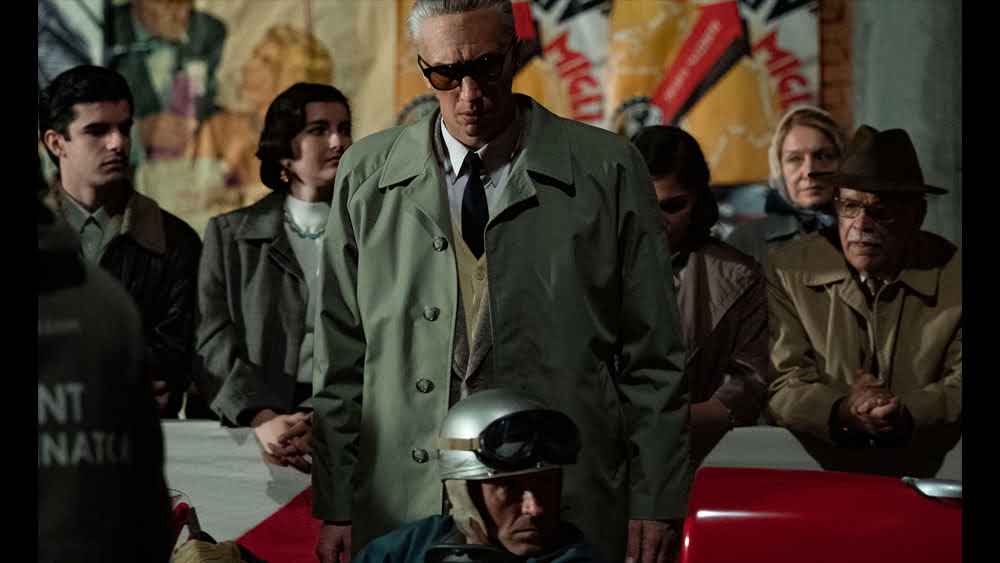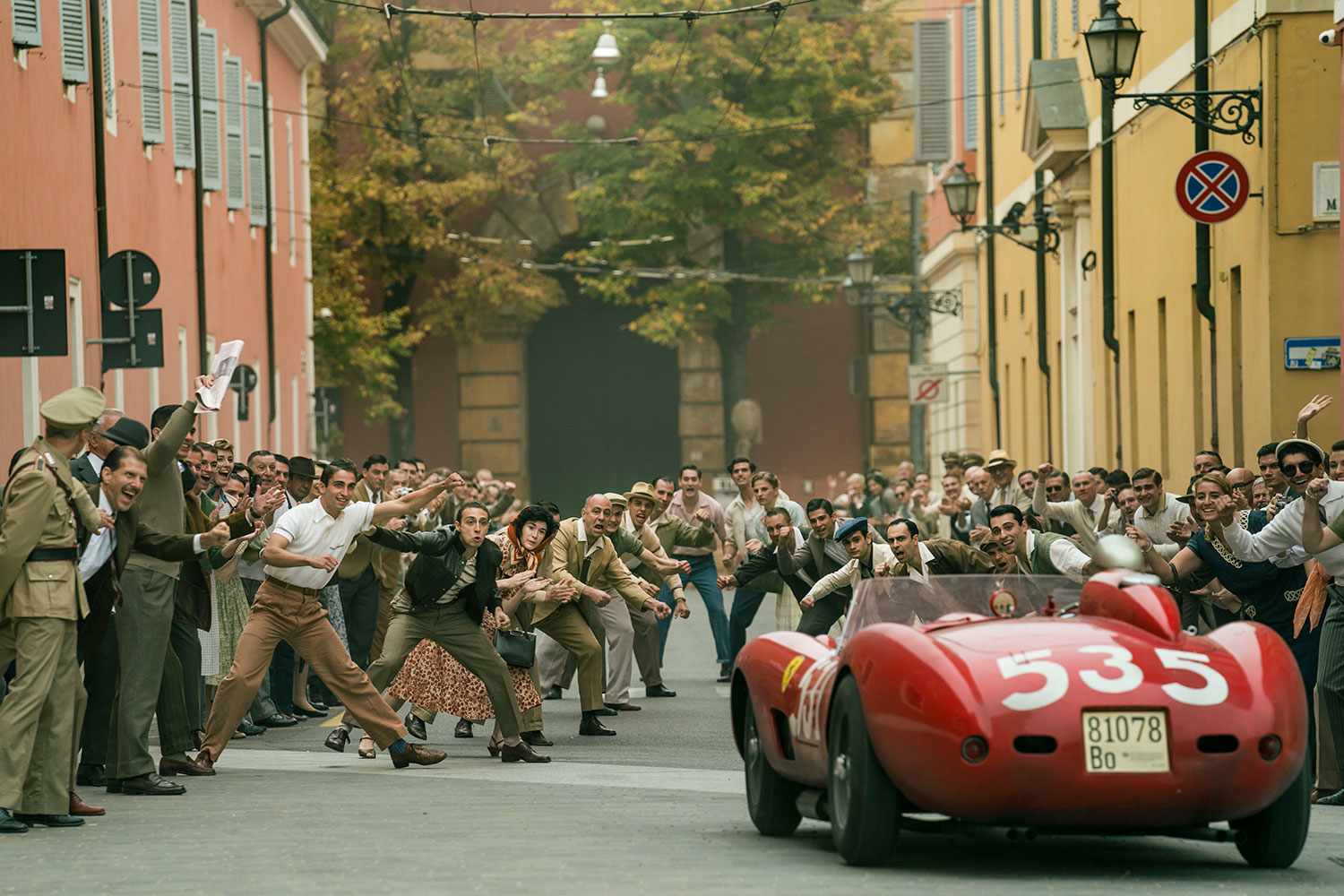Adam Driver’s ancestry does not appear to contain any Italian heritage, but you wouldn’t know it from the Italians with famous surnames he’s played recently at the movies. First it was Maurizio Gucci in Ridley Scott’s House of Gucci in 2021. Now he stars in Michael Mann’s latest as the man who birthed the Ferrari car company into existence, Enzo Ferrari. Ferrari is the second recent film to focus on this car company, at least tangentially, after James Mangold’s Ford v. Ferrari did so back in 2019. So there are multiple senses of being late to the party here, both in terms of Driver playing an Italian and the racing merits of Ferrari considered on film.
As such, Ferrari gets off to a wobbly start. The film engages in about 15 minutes of flailing about without purpose, flirting with cringe as Driver and other non-Italians do Italian accents. (Penelope Cruz, though, should be entitled to do whatever accent she wants.) Before you are frustrated enough to ask “Why am I watching this?”, Mann’s film does present a reason – but it’s not as indebted as you’d think to the mechanics of these cars or their ability to travel at high speeds. In fact, the much more interesting part of Ferrari is related to Enzo’s secret son, not acknowledged to the public or his wife, the result of an affair he is also keeping hidden.
It’s 1957, and Enzo Ferrari has been married to his wife Laura (Cruz) for long enough that they’ve already lost their adult son Dino to illness. That’s clouding his thoughts as he presides over his car company, the world’s finest example of automotive engineering, but one plagued by inefficiency. In the most recent financial year, they were only able to make 98 cars, which pales in output to other industry leaders whose balance sheets are a lot better looking. Enzo is facing the prospect of a hold-your-nose partnership with another auto company, even the dreaded Ford Motor Company. A former racer himself, Enzo’s focus has always been on the racing success of his cars, and he’s currently assembling a team of drivers to compete in the 1957 Mille Miglia, a race of more than 1,500 kilometres throughout the Italian countryside.
Laura has long known about his infidelities, and her only rule is that he’s back in their house in time that the servants see him at breakfast. When he fails at this task one morning, she pulls a gun on him. She looks as miserable as she feels, but so far she’s been spared the worst indignities related to a cheating husband. Enzo has been in a long-term relationship with Lina Lardi (Shailene Woodley, another American doing an Italian accent), which might not shock Laura much if she knew about it. What would shock her is that they have a 12-year-old son, Piero (Giuseppe Festinese), whom Lina is pressuring Enzo to acknowledge. Especially complicating the matter is that Laura was unable to produce him a second heir, all the more grave considering that the first heir died, and Enzo is desperate to leave his company to a son. Learning that he has an heir, but it’s not hers, might inspire Laura to actually use that gun.
Mann has a keen understanding of what he has in Cruz. More than once in the film, and almost to the point of feeling awkward, Mann holds his camera on Laura’s face as she processes a new piece of information or lets a slow realisation steadily spread through her features. Cruz continues to astonish us with the high quality of her craft, and she makes us feel both the anger and the sorrow of this woman who appears to have everything, but feels like she has nothing. Laura has a unique hold over Enzo as she has ownership of half the company, and if she isn’t completely happy with Enzo’s plans for it or for their marriage, she can hold the company hostage. Any tendency she shows toward that does not read to us as bitterness or vindictiveness, but rather, a logical response to her circumstances when she has a cad for a husband.
The portrayal of Enzo is interesting in that although he has not been true to his wife, it’s clear that he has also struggled with grief and that their marriage has not been right for a long time, even before his older son died. Powerful men always seem to have mistresses, and if we’re going only on stereotypes perpetuated by pop culture, this is especially the case with Italians, whose “goomahs” are a big part of any story focused on the mafia. Enzo at least seems to be true to the mother of his second son – who may be the only one mistress he has, when Laura thinks it’s a different one every week – and he seems to try to do the right thing.
We don’t want to give short shrift to the racing aspects of Ferrari. Always a maker of large-scale epics, Mann is understandably very capable with the racing scenes. Where he distinguishes himself is in two crash sequences, both of which induce gasps for confronting us with the horror of a disaster involving cars with open tops and little protection for the drivers. The second one also involves danger for the spectators, and Mann stages this tragic accident at Guidizzolo without compromise, forcing us to look at what happened and reckon with it.
Despite some moments of wheel spinning, Ferrari arrives at the finish line with a sense of providing us a solid entertainment that remains interested in its characters as people. Mann can and does wow us along the way with shots of cars going real fast. At its core, though, this is a film about a man facing complex decisions while trying to hurt as few people as possible. He did hurt them, emotionally as a direct result of his actions and physically through the bad luck of unpredictable circumstances. We get in the end a portrait of a flawed human being, who just so happens to have created a line of cars whose luxury endures today.
Ferrari opens in cinemas tomorrow, January 4th.


